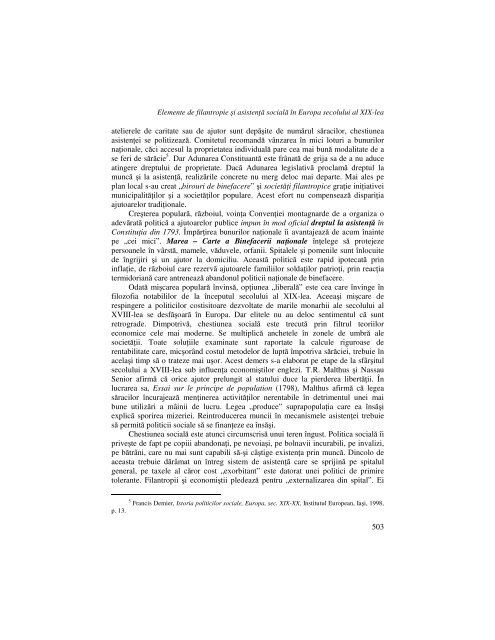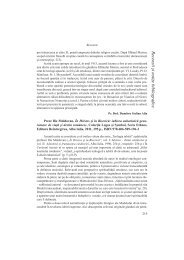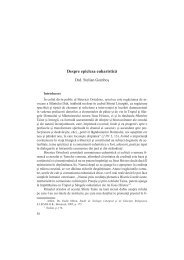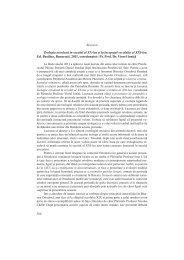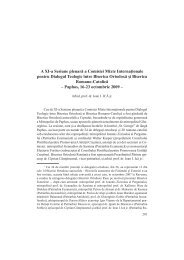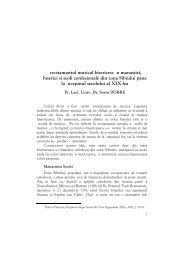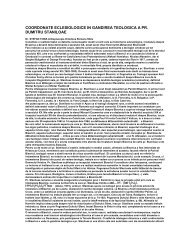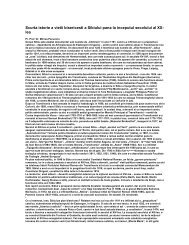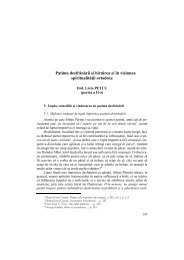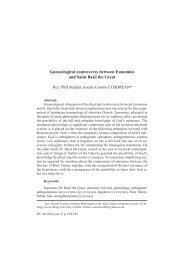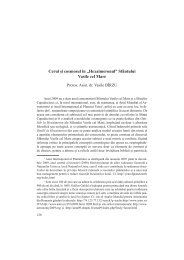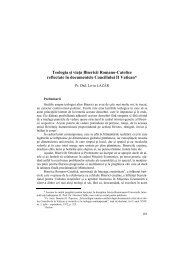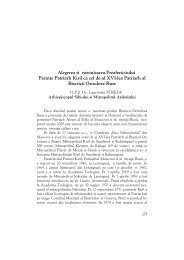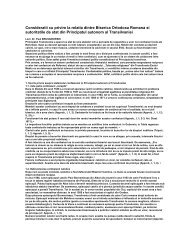Elemente de filantropie şi asisten ă socială în ... - Revista Teologica
Elemente de filantropie şi asisten ă socială în ... - Revista Teologica
Elemente de filantropie şi asisten ă socială în ... - Revista Teologica
You also want an ePaper? Increase the reach of your titles
YUMPU automatically turns print PDFs into web optimized ePapers that Google loves.
<strong>Elemente</strong> <strong>de</strong> <strong>filantropie</strong> <strong>şi</strong> <strong>asisten</strong>ţ<strong>ă</strong> social<strong>ă</strong> <strong>în</strong> Europa secolului al XIX-lea<br />
atelierele <strong>de</strong> caritate sau <strong>de</strong> ajutor sunt <strong>de</strong>p<strong>ă</strong><strong>şi</strong>te <strong>de</strong> num<strong>ă</strong>rul s<strong>ă</strong>racilor, chestiunea<br />
<strong>asisten</strong>ţei se politizeaz<strong>ă</strong>. Comitetul recomand<strong>ă</strong> vânzarea <strong>în</strong> mici loturi a bunurilor<br />
naţionale, c<strong>ă</strong>ci accesul la proprietatea individual<strong>ă</strong> pare cea mai bun<strong>ă</strong> modalitate <strong>de</strong> a<br />
se feri <strong>de</strong> s<strong>ă</strong>r<strong>ă</strong>cie 5 . Dar Adunarea Constituant<strong>ă</strong> este frânat<strong>ă</strong> <strong>de</strong> grija sa <strong>de</strong> a nu aduce<br />
atingere dreptului <strong>de</strong> proprietate. Dac<strong>ă</strong> Adunarea legislativ<strong>ă</strong> proclam<strong>ă</strong> dreptul la<br />
munc<strong>ă</strong> <strong>şi</strong> la <strong>asisten</strong>ţ<strong>ă</strong>, realiz<strong>ă</strong>rile concrete nu merg <strong>de</strong>loc mai <strong>de</strong>parte. Mai ales pe<br />
plan local s-au creat „birouri <strong>de</strong> binefacere” <strong>şi</strong> societ<strong>ă</strong>ţi filantropice graţie iniţiativei<br />
municipalit<strong>ă</strong>ţilor <strong>şi</strong> a societ<strong>ă</strong>ţilor populare. Acest efort nu compenseaz<strong>ă</strong> dispariţia<br />
ajutoarelor tradiţionale.<br />
Creşterea popular<strong>ă</strong>, r<strong>ă</strong>zboiul, voinţa Convenţiei montagnar<strong>de</strong> <strong>de</strong> a organiza o<br />
a<strong>de</strong>v<strong>ă</strong>rat<strong>ă</strong> politic<strong>ă</strong> a ajutoarelor publice impun <strong>în</strong> mod oficial dreptul la <strong>asisten</strong>ţ<strong>ă</strong> <strong>în</strong><br />
Constituţia din 1793. Împ<strong>ă</strong>rţirea bunurilor naţionale îi avantajeaz<strong>ă</strong> <strong>de</strong> acum <strong>în</strong>ainte<br />
pe „cei mici”. Marea – Carte a Binefacerii naţionale <strong>în</strong>ţelege s<strong>ă</strong> protejeze<br />
persoanele <strong>în</strong> vârst<strong>ă</strong>, mamele, v<strong>ă</strong>duvele, orfanii. Spitalele <strong>şi</strong> pomenile sunt <strong>în</strong>locuite<br />
<strong>de</strong> <strong>în</strong>grijiri <strong>şi</strong> un ajutor la domiciliu. Aceast<strong>ă</strong> politic<strong>ă</strong> este rapid ipotecat<strong>ă</strong> prin<br />
inflaţie, <strong>de</strong> r<strong>ă</strong>zboiul care rezerv<strong>ă</strong> ajutoarele familiilor soldaţilor patrioţi, prin reacţia<br />
termidorian<strong>ă</strong> care antreneaz<strong>ă</strong> abandonul politicii naţionale <strong>de</strong> binefacere.<br />
Odat<strong>ă</strong> mişcarea popular<strong>ă</strong> <strong>în</strong>vins<strong>ă</strong>, opţiunea „liberal<strong>ă</strong>” este cea care <strong>în</strong>vinge <strong>în</strong><br />
filozofia notabililor <strong>de</strong> la <strong>în</strong>ceputul secolului al XIX-lea. Aceea<strong>şi</strong> mişcare <strong>de</strong><br />
respingere a politicilor costisitoare <strong>de</strong>zvoltate <strong>de</strong> marile monarhii ale secolului al<br />
XVIII-lea se <strong>de</strong>sf<strong>ă</strong>şoar<strong>ă</strong> <strong>în</strong> Europa. Dar elitele nu au <strong>de</strong>loc sentimentul c<strong>ă</strong> sunt<br />
retrogra<strong>de</strong>. Dimpotriv<strong>ă</strong>, chestiunea social<strong>ă</strong> este trecut<strong>ă</strong> prin filtrul teoriilor<br />
economice cele mai mo<strong>de</strong>rne. Se multiplic<strong>ă</strong> anchetele <strong>în</strong> zonele <strong>de</strong> umbr<strong>ă</strong> ale<br />
societ<strong>ă</strong>ţii. Toate soluţiile examinate sunt raportate la calcule riguroase <strong>de</strong><br />
rentabilitate care, micşorând costul meto<strong>de</strong>lor <strong>de</strong> lupt<strong>ă</strong> împotriva s<strong>ă</strong>r<strong>ă</strong>ciei, trebuie <strong>în</strong><br />
acela<strong>şi</strong> timp s<strong>ă</strong> o trateze mai uşor. Acest <strong>de</strong>mers s-a elaborat pe etape <strong>de</strong> la sfâr<strong>şi</strong>tul<br />
secolului a XVIII-lea sub influenţa economiştilor englezi. T.R. Malthus <strong>şi</strong> Nassau<br />
Senior afirm<strong>ă</strong> c<strong>ă</strong> orice ajutor prelungit al statului duce la pier<strong>de</strong>rea libert<strong>ă</strong>ţii. În<br />
lucrarea sa, Essai sur le principe <strong>de</strong> population (1798), Malthus afirm<strong>ă</strong> c<strong>ă</strong> legea<br />
s<strong>ă</strong>racilor <strong>în</strong>curajeaz<strong>ă</strong> menţinerea activit<strong>ă</strong>ţilor nerentabile <strong>în</strong> <strong>de</strong>trimentul unei mai<br />
bune utiliz<strong>ă</strong>ri a mâinii <strong>de</strong> lucru. Legea „produce” suprapopulaţia care ea <strong>în</strong>s<strong>ă</strong><strong>şi</strong><br />
explic<strong>ă</strong> sporirea mizeriei. Reintroducerea muncii <strong>în</strong> mecanismele <strong>asisten</strong>ţei trebuie<br />
s<strong>ă</strong> permit<strong>ă</strong> politicii sociale s<strong>ă</strong> se finanţeze ea <strong>în</strong>s<strong>ă</strong><strong>şi</strong>.<br />
Chestiunea social<strong>ă</strong> este atunci circumscris<strong>ă</strong> unui teren <strong>în</strong>gust. Politica social<strong>ă</strong> îi<br />
priveşte <strong>de</strong> fapt pe copiii abandonaţi, pe nevoia<strong>şi</strong>, pe bolnavii incurabili, pe invalizi,<br />
pe b<strong>ă</strong>trâni, care nu mai sunt capabili s<strong>ă</strong>-<strong>şi</strong> câştige existenţa prin munc<strong>ă</strong>. Dincolo <strong>de</strong><br />
aceasta trebuie d<strong>ă</strong>râmat un <strong>în</strong>treg sistem <strong>de</strong> <strong>asisten</strong>ţ<strong>ă</strong> care se sprijin<strong>ă</strong> pe spitalul<br />
general, pe taxele al c<strong>ă</strong>ror cost „exorbitant” este datorat unei politici <strong>de</strong> primire<br />
tolerante. Filantropii <strong>şi</strong> economiştii ple<strong>de</strong>az<strong>ă</strong> pentru „externalizarea din spital”. Ei<br />
p. 13.<br />
5 Francis Demier, Istoria politicilor sociale, Europa, sec. XIX-XX, Institutul European, Ia<strong>şi</strong>, 1998,<br />
503


